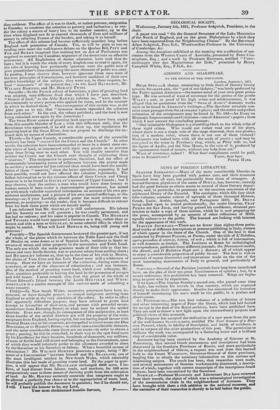NEWS OF FOREIGN LITERATURE.
SPANISH LIIIRARIES.—Many of the more considerable librariea in Spain have long been guarded with jealous care, and their treasures concealed from all eyes, but particularly from those of strangers. A learned German physician of the name of Dicrz, has, however, recently had the good fortune to obtain access to several of these literary depositaries, and, in particular, to penetrate to the sanctum sanctorum of the
celebrated library of the Escurial. The e which fills four thick ' folio volumes, contains notices of upwards three thousand Hebrew,
Greek, Latin, Arabic, Spanish, and Portuguese MSS. Dr. DIETZ being called upon to attend professionally, the under librarian, FRAY PEDRO DE SAN JOSE, and having gained his confidence, obtained per mission to make a copy of these notices, which he is now preparing for the press, accompanied by an account of other collections of MSS. equally unknown to the public. The learned are looking with interest for the appearance of this work. ITALIAN Jouastar.s.—There are no fewer than eighty-three periodical works of different descriptions at present publishing in Italy, sixteen
of which appear in the State of the Church. One of the best is that
conducted by Professor PASTOR', at Parma, under the title of L'Eclettico, opera periodica di scienze, lettere, ed arti ; which is full of information,
as well domestic as foreign. The Institute at Rome for archaiological correspondence, publishes three different journals, the Monumentiinediti, the Annali, and Ii Bulletino Degli arti e Scienz e ; all of which appear to enjoy a considerable proportion of public favour. The first is rich in accounts of recent discoveries and excavations made on the site of the most interesting monuments of Italy in general, and particularly of Rome.
Sasses:sta.—Several of the Parisian journals have long been interdicted here, on the plea of their too great licentiousness of opinion ; but, by a recent ordinance, this prohibition has been removed. Kings are beginning to grow wise by experience.
WET atan.—The veteran Goethe's second son, who passed some time in Italy, has written his travels in that country, which are expected
shortly to make their appearance. Goethe has announced his intention of himself introducing his son's work-to the public, in a preface and observations.
Sr. PETERSBURG.—The two first volumes of a collection of letters and other interesting papers of Peter the Great, which had laid buried for an age in the dust of the Royal archives, have been published here. They are said to throw a new light upon the extraordinary projects and political views of this monarch. The Emperor has accepted the dedication of a new poem from the pen of the well-known SLOEMSCHKIN' entitled The Four Seasons of a Rus sian Peasant, which, in fidelity of description and finish of numbers, is said to surpass all the other productions of this poet. The permission to dedicate the work was accompanied by a flattering letter and a brilliant ring of considerable value.
Accounts having beep received by the Academy of Sciences at St. Petersburg, that several Greek monuments and inscriptions had been
discovered in the Southern Provinces of Russia, and more particularly in the neighbourhood of Odessa, a request was sent from this learned body to the Count WORONZOW, _Governor-General of these provinces, begging him to obtain the necessary information on this curious and interesting subject. The result has been that researches were made, and several monuments of Grecian workmanship discovered, a description of which, together with correct transcripts of the inscriptions found thereon, have been transmitted by the Governor. NonwAy.—Professor-ILissraaw and Lieutenant Des have returned from their travels, the object of which was a mineralogical investigation of the mountainous chain in the neighbourhood of Astracan. They have brought with them a rich addition to the national museum, and the narrative of their researchesis shortly to be laid before the public.


























 Previous page
Previous page